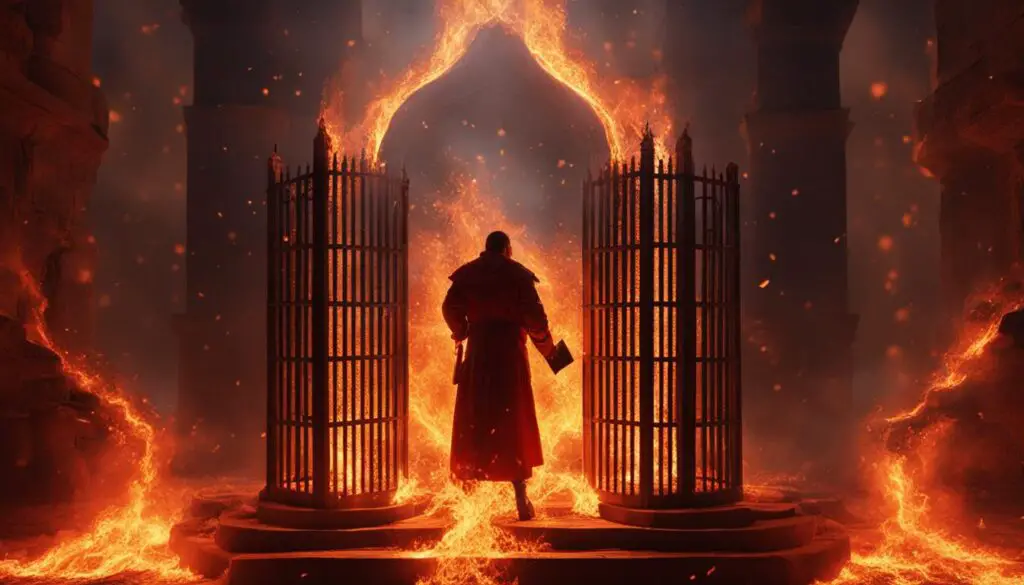Iron holds a significant place in the Bible, symbolizing strength and endurance. Throughout the Old Testament, iron is mentioned in various contexts, representing the resilience of the land of Israel and its people. It is also used metaphorically to convey firmness and stability in biblical narratives.
Key Takeaways:
- Iron in the Bible symbolizes strength and endurance.
- It represents the firmness and stability of biblical narratives.
- Iron is mentioned throughout the Old Testament in various contexts.
- It holds symbolic significance for the land of Israel and its people.
- Iron is also used metaphorically to convey deeper meanings in biblical texts.
Historical Significance of Iron
Iron holds a significant place in history, both as a material and as a symbol. In biblical times, the art of working with iron was not widely known until around 1000 BC. However, references to iron and its use can be found throughout the Bible, shedding light on its historical importance. One notable example is the mention of iron in the tomb of Rameses III, suggesting its presence in ancient Egypt and its subsequent spread to regions like Syria and Palestine.
References to iron in specific Bible verses highlight its significance in daily life during biblical times. For example, iron is mentioned in the construction of gates, city walls, temple artifacts, and various tools used in building projects. These references emphasize the practical use of iron as a material for construction and highlight its durability and stability.
“And he made hooks of iron for the pillars and overlaid their capitals and made fillets of bronze to go over the hooks.” – 1 Kings 7:50
The presence of iron in the Bible provides us with historical insights into the development of metalworking techniques and the advancements in construction during ancient times. It also serves as a reminder of the importance of iron as a material that played a vital role in the daily lives of the people of that era.
| Verse | Reference |
|---|---|
| Proverbs 27:17 | “Iron sharpens iron, and one man sharpens another.” |
| Jeremiah 15:12 | “Can anyone break iron, the northern iron and the bronze?” |
| 1 Kings 6:7 | “The house, while it was being built, was built of stone prepared at the quarry, and there was neither hammer nor axe nor any iron tool heard in the house while it was being built.” |
These references demonstrate the historical significance of iron in biblical times and its role in various aspects of life, including construction, trade, and everyday tools and objects.
Iron as a Symbol of Strength and Endurance
In the Bible, iron holds deep symbolic significance as a representation of strength and endurance. This symbolism is derived from the inherent qualities of iron, which is known for its durability and ability to withstand wear and tear. Throughout the Old Testament, references to iron highlight the strength of the land of Israel and its people.
An example of iron’s symbolic significance can be found in the story of David and Goliath. When David faced the giant Philistine warrior, he chose to fight him with a sling and five smooth stones. One of these stones struck Goliath in the forehead and killed him, demonstrating how even the strongest adversaries can be overcome with the strength and endurance represented by iron.
Iron also played a crucial role in the creation of weapons during biblical times. The biblical narrative often mentions the use of iron in crafting swords, spears, and other tools of war. This further reinforces the association between iron and strength, highlighting its symbolic significance in the context of warfare and conflict.
| Symbolic Meaning of Iron in the Bible | Significance |
|---|---|
| Strength | Iron represents physical and spiritual strength, emphasizing the power to overcome challenges and obstacles. |
| Endurance | The durability of iron symbolizes the ability to withstand hardships and persevere in times of adversity. |
“Iron sharpens iron, and one man sharpens another.” – Proverbs 27:17
Iron’s symbolic association with strength and endurance serves as a powerful reminder for believers to rely on God’s strength in times of difficulty and to persevere in their faith journey. Just as iron sharpens iron, the passage in Proverbs 27:17 encourages Christians to support and sharpen one another in their spiritual growth.
Iron Strength in Bible Verses
Throughout the Bible, iron is mentioned in various verses that emphasize its role as a symbol of strength. For example, in Job 40:18, the strength of the behemoth, a creature described with powerful attributes, is compared to “bars of iron.” This comparison highlights the immense strength and power associated with iron.
Iron is also mentioned in Psalm 107:10-16, where the people are described as “sitting in darkness and in the shadow of death, prisoners in affliction and in irons.” Here, iron is used metaphorically to represent affliction and captivity, underscoring the strength required to overcome such challenges.
In conclusion, iron’s symbolic representation of strength and endurance in the Bible serves as a powerful reminder for believers to rely on God’s strength in times of difficulty and to persevere through hardships. The association between iron and strength is evident throughout biblical narratives, reinforcing its symbolic significance. By understanding the deeper meaning behind iron’s portrayal in the Bible, believers can draw inspiration and encouragement to face life’s challenges with faith and resilience.
Iron and Metaphorical Use
Iron is not only a physical element but also holds deep symbolic meaning in the Bible. Its metaphorical use conveys various concepts and messages, highlighting the richness and complexity of its symbolism. Let’s explore some of the symbolic meanings associated with iron in biblical narratives.
Iron as Affliction and Chastisement
“Your calf, O Samaria, has rejected you; my anger burns against them. How long will they be incapable of purity? For this calf— a metalworker has made it; it is not God.”
In this passage, iron is used metaphorically to represent affliction and chastisement. It symbolizes the consequences of the Israelites’ idolatrous practices and their rejection of God’s commandments. The use of iron highlights the severity of their actions and the need for repentance.
Iron as Barrenness and Slavery
In biblical texts, iron is sometimes associated with barrenness and slavery. This symbolism highlights the harshness and oppression experienced by the Israelites during periods of captivity and servitude.
Iron as Fortitude and Strength
On the other hand, iron is also used metaphorically to convey fortitude and strength. It symbolizes the unwavering faith and resilience of believers, who rely on the power of God to overcome challenges and face spiritual battles.
| Metaphorical Use of Iron | Symbolic Meaning |
|---|---|
| Affliction and chastisement | Consequences of disobedience |
| Barrenness and slavery | Hardship and oppression |
| Fortitude and strength | Resilience and faith |
These are just a few examples of how iron is metaphorically used in the Bible to convey profound spiritual concepts. Its symbolic meanings reflect the narrative’s themes of judgment, redemption, and the enduring power of God.

Iron as a Material for Building
Iron’s firmness and stability make it an ideal material for construction purposes, with numerous references in the Bible highlighting its practical use in building projects. From gates and city walls to temple artifacts and various tools, iron played a significant role in the construction and development of structures during biblical times.
In Exodus 27:1-8, detailed instructions were given for the construction of the altar of burnt offering, which included a framework made of acacia wood overlaid with bronze, and a grate of bronze. This demonstrates the combination of different materials, including iron, to construct important religious artifacts.
A notable example of iron’s significance in construction is found in 1 Kings 6:7, which describes the building of Solomon’s temple: “The stones used in the construction of the Temple were finished at the quarry, so there was no sound of hammer, ax, or any other iron tool at the building site.” This passage suggests that iron was used extensively in the temple’s construction, but the final stages involved a careful assembly that required minimal use of iron tools, creating a sense of reverence and awe for the structure.
“The stones used in the construction of the Temple were finished at the quarry, so there was no sound of hammer, ax, or any other iron tool at the building site.”
Iron in Construction: A Symbol of Strength and Durability
Iron’s inclusion in the construction of various structures in the Bible represents more than just its practical application. It also symbolizes strength, durability, and the ability to withstand external forces. Just as iron can provide stability to buildings, it serves as a metaphor for the steadfastness and endurance of God’s people.
In Isaiah 54:17, it is written: “No weapon forged against you will prevail.” This passage, along with the use of iron in construction, conveys the idea that God’s protection and strength will guard His people against any adversity or attack. Iron’s association with construction reinforces the spiritual truth that those who build their lives on a foundation of faith in God will not be easily shaken.
Furthermore, the use of iron in construction also mirrors the divine craftsmanship and attention to detail exhibited by God. Just as careful planning and skill are required to construct a solid and enduring building, God’s creation of the world and His ongoing involvement in the lives of His people demonstrate His wisdom and artistry.
Table: Iron in Construction References
| Reference | Description |
|---|---|
| Exodus 27:1-8 | Instructions for constructing the altar of burnt offering, which included a framework made of acacia wood overlaid with bronze. |
| 1 Kings 6:7 | Describes the building of Solomon’s temple and the minimal use of iron tools during the final stages of construction. |
Iron’s prominent role in construction throughout the Bible serves as a reminder of its practical and symbolic significance. It represents strength, durability, and the divine craftsmanship exhibited in both the physical and spiritual realms. Understanding the deeper meanings associated with iron in construction enhances our appreciation for the biblical narratives and the lessons they impart.
Iron in Spiritual Warfare and Protection

The concept of spiritual warfare and protection is symbolically represented by iron in the Bible. Iron, with its strength and durability, serves as a metaphor for the protection and strength that believers receive from righteousness in their spiritual battles. This symbolism is seen in Isaiah 59:17, where the “breastplate of righteousness” is compared to a breastplate made of iron. This imagery emphasizes the vital role of righteousness in defending against spiritual attacks.
Throughout the Bible, iron’s association with protection is further highlighted in various narratives. In Judges 6:34, the Spirit of the Lord comes upon Gideon, empowering him to deliver Israel from their enemies. Gideon’s weapon of choice? A supernatural iron sword. This account showcases how God uses iron as a means of protection and empowerment for His chosen ones.
Additionally, iron’s connection to spiritual warfare can be found in Ephesians 6:10-18, where believers are encouraged to put on the “full armor of God.” The armor includes the “breastplate of righteousness,” which, reminiscent of Isaiah 59:17, represents the protective power of God’s righteousness and serves as a defense against spiritual attacks. In the battle against unseen forces, iron symbolizes the strength and protection provided by God.
Iron’s Symbolic Significance:
- Protection: Iron represents the protection and strength that believers receive from righteousness in their spiritual battles.
- Empowerment: Iron is associated with God’s empowerment and the ability to overcome enemies.
- Spiritual Armor: Iron is referenced in the “breastplate of righteousness” as a crucial component of the armor of God.
Iron’s symbolic representation in spiritual warfare and protection highlights the significance of righteousness and God’s strength in navigating the challenges believers face in their spiritual journeys.
| Symbolic Meaning | Biblical References |
|---|---|
| Protection and Strength | Isaiah 59:17, Judges 6:34 |
| Empowerment | Judges 6:34 |
| Spiritual Armor | Ephesians 6:10-18 |
Iron as a Symbol of Refinement and Purification
In the Bible, iron holds a profound symbolic meaning of refinement and purification. Proverbs 27:17 states, “Iron sharpens iron,” conveying the idea that people can strengthen and refine one another through honest feedback and constructive criticism. This metaphor underscores the importance of mutual growth and development in relationships.
Furthermore, the book of Malachi speaks of God’s purifying process, using iron as a metaphor. Malachi 3:3 states, “He will sit as a refiner and purifier of silver; he will purify the Levites and refine them like gold and silver.” Here, iron symbolizes the refining fire through which God purifies His people, removing impurities and transforming them to be more like Him.
These symbolic references highlight the transformative power of iron in the spiritual realm. Just as iron is heated and shaped through fire, individuals are refined and purified through trials and challenges, resulting in personal growth and spiritual maturity.
| Symbolic Meaning | Biblical Reference |
|---|---|
| Refinement | Proverbs 27:17 |
| Purification | Malachi 3:3 |
In summary, iron’s symbolic significance as a representation of refinement and purification in the Bible reminds us of the transformative power of God’s refining fire and the importance of growth and development in relationships. As iron is sharpened through friction, believers can refine and purify one another through honest feedback and constructive criticism, fostering personal growth and spiritual maturity. Just as iron undergoes a process of transformation through fire, individuals can emerge stronger and more purified through the trials and challenges they face in life.
Iron as a Symbol of Wealth and Prosperity
Iron holds more than just symbolic significance in the Bible; it also played a crucial role in trade and commerce during biblical times. As a valuable commodity, iron was often exchanged in transactions, highlighting its association with wealth and material abundance. In fact, in discussions about King Solomon’s wealth, iron was mentioned alongside gold and silver, showcasing its importance in economic prosperity.
Trade routes facilitated the distribution of iron, with regions like Tarshish and Egypt being the likely sources of this precious metal. Merchants and traders recognized the value of iron, and its inclusion in trade further enhanced its symbolic meaning as a marker of wealth and prosperity.
To better understand the significant role of iron in trade during biblical times, let’s take a closer look at a table detailing the trade of iron and its economic impact:
| Kingdom or Region | Iron Trade | Economic Impact |
|---|---|---|
| Israel | Imported iron for construction and weaponry | Enhanced military strength and infrastructure development |
| Phoenicia | Exported iron products to various regions | Generated substantial revenue and fostered economic growth |
| Egypt | Exported iron to neighboring lands, including Israel | Strengthened diplomatic relations and economic ties |
As seen in the table, the trade of iron had a profound impact on the economies of various kingdoms and regions, contributing to their growth and prosperity. This reinforces the significance of iron as a symbol of wealth and material abundance in biblical narratives.

Iron in Trade: Key Takeaways
- Iron played a vital role in trade and commerce during biblical times.
- It was a valuable commodity exchanged in transactions.
- Iron’s inclusion in trade showcased its association with wealth and material abundance.
- The trade of iron had a significant economic impact on various kingdoms and regions.
Iron as a Sign of Covenant
In the Bible, iron is associated with ancient rituals and possibly covenant rituals involving iron objects. Deuteronomy 4:20 mentions iron in the context of God bringing the Israelites out of Egypt to be His people. This implies a deeper symbolic meaning of iron in relation to the covenant between God and His chosen people.
The use of iron in ancient rituals signifies a bond and agreement between parties. Iron is known for its strength and durability, and its inclusion in covenant ceremonies would have represented the lasting nature of the agreement. The use of iron in this context also emphasizes the seriousness and permanence of the covenant.
Iron objects may have been used in ritualistic practices as a physical representation of the covenant relationship. Just as iron is strong and unyielding, the covenant between God and His people was meant to be steadfast and unwavering.

Overall, the mention of iron in the Bible in the context of covenant rituals highlights the importance of commitment and loyalty. It serves as a reminder of the enduring nature of God’s relationship with His people and the strength required to uphold the covenant.
Iron’s Connection to Fire and Prophecy
Iron has a strong connection to fire in biblical imagery. Psalm 18:34-35 describes God making someone’s feet strong like iron, emphasizing the connection between iron and strength. This imagery suggests that iron represents not only physical strength but also spiritual fortitude and resilience in the face of adversity. The association between iron and fire underscores the transformative power and purifying nature of divine intervention. Just as fire refines and purifies precious metals, iron symbolizes the refining process believers undergo to become spiritually stronger.
Iron is also mentioned in various prophecies found in the Bible, particularly in books like Ezekiel and Daniel. In these prophecies, iron symbolizes different kingdoms and empires throughout history. For example, Daniel’s vision of the statue in Daniel 2:31-45 describes four successive kingdoms, with each kingdom represented by a different material: gold, silver, bronze, and iron. The iron teeth mentioned in these prophecies symbolize the destructive power of these kingdoms and the upheaval they bring. The inclusion of iron in prophetic literature highlights its significance as a symbol of power, dominion, and the unfolding of future events.
“His legs of iron, his feet partly of iron and partly of clay.” – Daniel 2:33
The Symbolic Significance of Iron in Prophecy
Iron’s connection to fire and prophecy underscores its symbolic importance in the biblical narrative. The strong association between iron and fire highlights the transformative and purifying nature of divine intervention, while the mention of iron in prophetic writings signifies the rise and fall of kingdoms and the fulfillment of God’s predetermined plans. The inclusion of iron in these prophecies serves as a reminder of the sovereignty and providence of God in shaping human history.

| Iron in Fire and Prophecy | Symbolic Meaning |
|---|---|
| Connection to fire | Represents strength, endurance, and purification |
| Association with prophecy | Symbolizes different kingdoms and their destructive power |
| Transformative and purifying nature | Reflects the refining process believers undergo |
| Significance in biblical narrative | Highlights the sovereignty and providence of God |
The correlation between iron, fire, and prophecy in the Bible showcases the deep symbolic meaning attributed to iron. It represents not only physical strength and endurance but also the transformative and purifying process believers undergo in their faith journey. Iron’s inclusion in prophetic literature emphasizes its role in signifying the rise and fall of kingdoms and the fulfillment of God’s plans. Overall, iron’s connection to fire and prophecy serves as a powerful reminder of God’s sovereignty and the profound symbolism woven throughout the biblical narrative.
Fellowship and Accountability in Iron Sharpens Iron
The phrase “iron sharpens iron” holds deep significance in the Christian community, emphasizing the importance of fellowship and accountability for spiritual growth. It reflects the idea that believers can sharpen and refine each other through intentional relationships and mutual encouragement.
In the context of friendship, iron sharpens iron refers to the power of relationships that challenge, inspire, and support one another. Just as iron can only be sharpened by another piece of iron, individuals can experience personal growth and refinement through the influence of trusted friends. These friendships provide a safe space for vulnerability, honest feedback, and the sharing of experiences, resulting in a stronger and more resilient faith.
Iron sharpens iron also highlights the significance of accountability in the Christian walk. When believers hold each other accountable, they help ensure adherence to biblical principles and foster spiritual maturity. This accountability can manifest in various ways, such as regular meetings, prayer partnerships, and open discussions about personal struggles and victories. Through this mutual accountability, believers can stay focused on their spiritual journey and be encouraged to live lives that honor God.
In summary, iron sharpens iron conveys the idea that genuine fellowship and accountability play crucial roles in the growth and refinement of a believer’s faith. These relationships provide opportunities for encouragement, challenge, and support, ultimately leading to spiritual growth, maturity, and a deeper connection with God.
“As iron sharpens iron, so one person sharpens another.” – Proverbs 27:17
Conclusion
In conclusion, the symbolic significance of iron in the Bible cannot be understated. Throughout the Old Testament, iron is associated with strength, endurance, and firmness. It represents the strength of the land of Israel and the durability of weapons crafted from iron.
Iron also holds metaphorical meanings, symbolizing affliction, chastisement, and severity. It conveys the concept of divine judgment and divine power. Additionally, iron is used to represent refinement and purification, highlighting its role in strengthening believers and purifying them through challenges.
Furthermore, iron’s association with wealth, covenant, fire, and prophecy adds layers of meaning to its symbolism. It serves as a material for building structures and is mentioned in the context of King Solomon’s prosperity. Iron is also connected to fire in biblical imagery, emphasizing strength and power.
Finally, the phrase “iron sharpens iron” emphasizes the importance of fellowship and accountability in the Christian community. It encourages mutual growth, refinement, and support among believers. Overall, iron’s symbolism in the Bible provides profound insights into various aspects of faith, strength, and spiritual battles.
FAQ
What is the symbolic meaning of iron in the Bible?
Iron holds symbolic significance in the Bible, representing strength and endurance. It is often associated with the strength of the land of Israel and used to create weapons. Iron also symbolizes firmness and stability in biblical narratives.
When was the art of working with iron known?
The art of working with iron was not widely known until around 1000 BC. However, references to iron and its use can be found in the Bible, such as in the tomb of Rameses III.
How was iron likely brought to Syria and Palestine?
Iron was likely brought to Syria and Palestine from regions like Tarshish and Egypt.
What objects and tools made of iron are mentioned in the Bible?
Verses in the Bible mention various objects and tools made of iron, highlighting its significance in daily life during biblical times.
What does iron symbolize in the Bible?
Iron is often seen as a symbol of strength and endurance in the Bible. It is associated with the durability and ability to withstand wear and tear. Iron also symbolizes firmness, stability, and the strength of the land of Israel.
How is iron used metaphorically in the Bible?
Iron is used metaphorically in the Bible to represent affliction, chastisement, and severity. It can also symbolize barrenness, slavery, fortitude, and the strength and power of God.
What is the practical use of iron in construction during biblical times?
Iron is mentioned in the Bible in the construction of gates, city walls, temple artifacts, and various tools used in building projects. This highlights the practical use of iron in construction during biblical times.
What does iron symbolize in spiritual warfare and protection?
Iron symbolizes spiritual warfare and protection in the Bible. It is compared to a breastplate made of iron, signifying the protection and strength believers receive from righteousness in their spiritual battles.
How is iron associated with refinement and purification?
Iron is associated with refinement and purification in the Bible. The concept of “iron sharpens iron” indicates that people can strengthen and refine each other through honest feedback and constructive criticism. Iron is also used as a metaphor for God’s purification of His people.
What is iron’s significance in terms of wealth and prosperity in the Bible?
Iron was a valuable commodity used for trade in biblical times. It is mentioned in the context of King Solomon’s wealth, highlighting its significance as a symbol of wealth and material abundance.
What is the connection between iron and the covenant in the Bible?
The Hebrew word for iron is associated with ancient rituals and possibly covenant rituals involving iron objects. This implies a deeper symbolic meaning of iron in relation to the covenant between God and His chosen people.
How is iron connected to fire and prophecy in biblical imagery?
Iron has a strong connection to fire in biblical imagery. It is mentioned in prophetic literature, symbolizing different kingdoms and the destructive power of iron teeth in future events.
What does the phrase “iron sharpens iron” signify?
The phrase “iron sharpens iron” emphasizes the importance of fellowship and accountability in the Christian community. It highlights the mutual benefit and growth that comes from close relationships with fellow believers.







